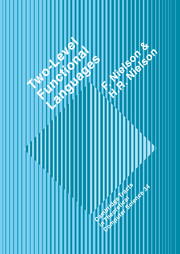7 - Abstract Interpretation
Published online by Cambridge University Press: 12 October 2009
Summary
The rationale behind the development of parameterized semantics in Chapter 5 is that it facilitates a multitude of interpretations of the mixed λ-calculus and combinatory logic. We saw examples of ‘standard semantics’ in Chapter 5 and a code generation example in Chapter 6 and in this chapter we shall give examples of static program analyses. We shall follow the approach of abstract interpretation but will only cover a rather small part of the concepts, techniques and tools that have been developed. The Bibliographical Notes will contain pointers to some of those that are not covered; in particular the notions of liveness (as opposed to safety), inducing (a best analysis) and expected forms (for certain operators).
We cover a basic strictness analysis in Section 7.1. It builds on Wadler's four-point domain for lists of base types but generalizes the formulation to lists of arbitrary types. In Section 7.2 we then illustrate the precision obtained by Wadler's notion of case analysis. We then review the tensor product which has been put forward as a way of modelling so-called relational program analyses (as opposed to the independent attribute program analyses). Finally we show that there is a rather intimate connection between these two ideas.
Strictness Analysis
Strictness of a function means that ⊥ is mapped to ⊥. In practical terms this means that if a function is strict it is safe to evaluate the argument to the function before beginning to evaluate the body of the function.
- Type
- Chapter
- Information
- Two-Level Functional Languages , pp. 207 - 252Publisher: Cambridge University PressPrint publication year: 1992



